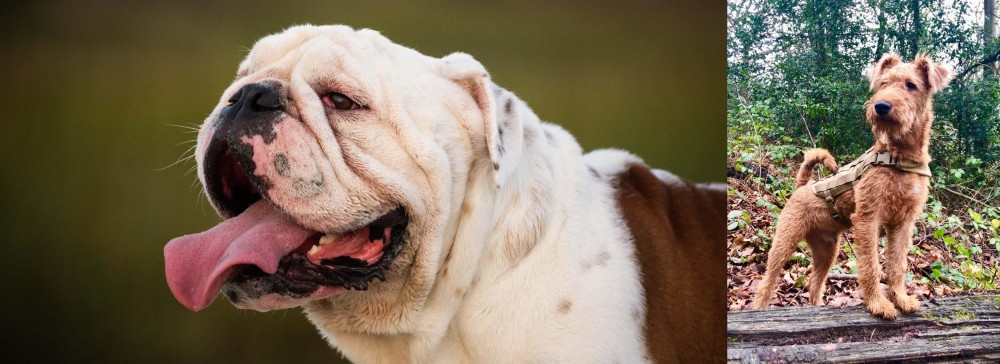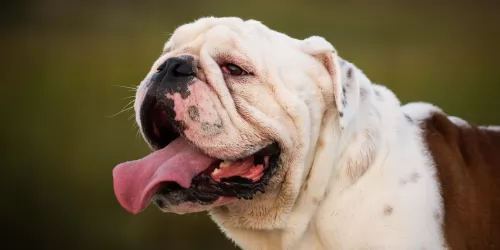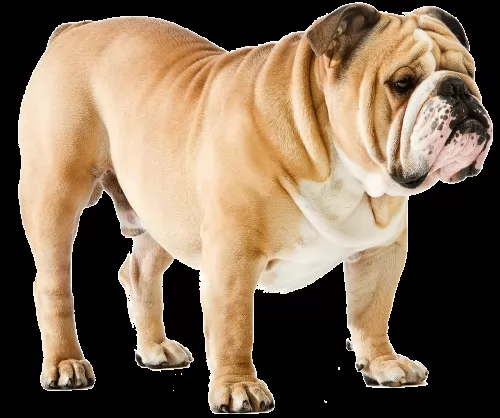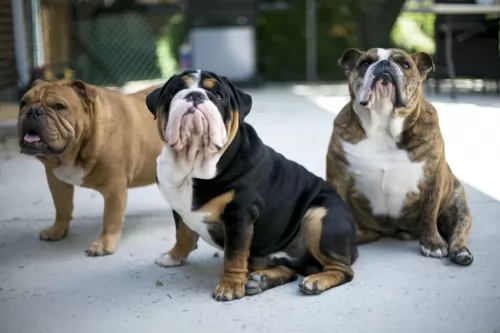 Petzlover
Petzlover English Bulldog is originated from United Kingdom but Irish Terrier is originated from Ireland. English Bulldog may grow 10 cm / 3 inches shorter than Irish Terrier. English Bulldog may weigh 13 kg / 29 pounds more than Irish Terrier. English Bulldog may live 3 years less than Irish Terrier. Both English Bulldog and Irish Terrier has almost same litter size. English Bulldog requires Low Maintenance. But Irish Terrier requires Moderate Maintenance
English Bulldog is originated from United Kingdom but Irish Terrier is originated from Ireland. English Bulldog may grow 10 cm / 3 inches shorter than Irish Terrier. English Bulldog may weigh 13 kg / 29 pounds more than Irish Terrier. English Bulldog may live 3 years less than Irish Terrier. Both English Bulldog and Irish Terrier has almost same litter size. English Bulldog requires Low Maintenance. But Irish Terrier requires Moderate Maintenance
 At earlier time English Bulldogs were not as it was now. They were taller and was fierce in their nature. They were completely developed in England.The first breed was set in at about 1500. After that they were involved in a game called Bull baiting in England, where a fight was set in between a Bull and the Bulldog.
At earlier time English Bulldogs were not as it was now. They were taller and was fierce in their nature. They were completely developed in England.The first breed was set in at about 1500. After that they were involved in a game called Bull baiting in England, where a fight was set in between a Bull and the Bulldog.
English Bulldogs will be on full fierce by biting and holding the bull even when they jump or struggle, until they fall on the ground. After that Bull baiting was banned in England, and everyone thought Bulldog will disappear. But some breeders re engineered it and made it as it was now. In 1950s Bulldogs ranked among top 10 in America.
 The Irish Terrier is a dog breed from Ireland and one of the many different terrier breeds there are.
The Irish Terrier is a dog breed from Ireland and one of the many different terrier breeds there are.
Nobody is too sure of the Irish Terrier's history but it is one of the oldest terrier breeds. It appears as if the dog breed was developed from a wheat colored terrier and the extinct black and tan terrier.
It was always a common practice to crop the ears of terriers, but in 1889 the Irish Terrier Club required that the ears remain uncropped. The first Irish Terrier was shown in 1881, and the first Irish Terrier registered with the American Kennel Club was in 1885. The Irish Terrier Club of America was founded in 1896.
 English Bulldogs are muscular in nature. They easily gain over weight and so exercising them is very mandatory. They are well suitable for apartment living, since they will always like to lie down and sleep. They will woke up only for their food. But they are very much faithful for their owners and it will be seen very loving when they come near and look at you.
English Bulldogs are muscular in nature. They easily gain over weight and so exercising them is very mandatory. They are well suitable for apartment living, since they will always like to lie down and sleep. They will woke up only for their food. But they are very much faithful for their owners and it will be seen very loving when they come near and look at you.
Since they face respiratory problems they should not be compelled to play for very long time. Their look may be ferocious but they are very calm and loving towards others unless you do any harm to them or their owners.
 The Irish Terrier is a medium sized dog who stands between 45cm and 50cm and weighs in the region of 11 to 12kg. He has a short, dense, wiry double coat which is a red, golden, sandy, wheaten color.
The Irish Terrier is a medium sized dog who stands between 45cm and 50cm and weighs in the region of 11 to 12kg. He has a short, dense, wiry double coat which is a red, golden, sandy, wheaten color.
The ears of the dog are semi-erect/semi-floppy and the tail is held high and curved.The chest is deep and muscular and the front and back legs are strong, long and muscular.
The Irish Terrier is a companion dog today, even though he was once a guard- and hunting dog. He is an amicable dog while also being alert and active. He is also independent and strong-willed so he will require training and socialization as then he becomes obedient and relaxed and much easier to live with.
They're social dogs too, loving all the members of their human family, getting on well with children in the home.
 They are good companion for children, but it is recommended to have an adult supervision and not allowing them alone.
They are good companion for children, but it is recommended to have an adult supervision and not allowing them alone.
They are the best companion dogs. They take decisions after thinking for a while. They are very faithful for their owners, and if anybody does harm to their owners infront of them, then they will show their full energy and teach a lesson to them.
They adapt well for apartment living. They can be leaved alone in home for some hours but they love to stay with anyone in the house. English Bulldog love to live in moderate weather, both hot and cold weather will bring problems to them.
Bulldog will not do all things you order them, as they think well and take their decision well. They think what will they get by doing what you say, and then only they will do it.
 Irish Terriers are good with people and want to be an active member of their human families.
Irish Terriers are good with people and want to be an active member of their human families.
They are active dogs and will require ongoing mental and physical stimulation. This is a lively dog, but he still loves to spend quiet time indoors with his family.
They’re intelligent dogs with a strong sense of loyalty towards their owner, making excellent family pets.
 They have chances of getting problems due to brachycephalic syndrome, this is because of their short face. Also they suffer from respiratory problems. Bone and joint problems are also common in them.
They have chances of getting problems due to brachycephalic syndrome, this is because of their short face. Also they suffer from respiratory problems. Bone and joint problems are also common in them.
English Bulldog has chances of getting skin problems and hair fall is the initial for those skin problems. Normally they shed hair upto a considerable level.
 The Irish Terrier is a healthy dog breed and you won't find yourself running to the vet often with him, but still he can land up with one of the common dog problems.
The Irish Terrier is a healthy dog breed and you won't find yourself running to the vet often with him, but still he can land up with one of the common dog problems.
It is always wise to be aware of hip dysplasia as this is a disease which can occur in all dog breeds and all dog ages. Also look out for eye diseases such as progressive retinal atrophy and cataracts as these can lead to blindness in your pet.
There is a disease known as cystinuria which is quite a concern with Irish Terriers. It’s an inherited kidney disease where increased amounts of arginine, lysine, amino acids cystine and ornithine are excreted in the urine.
In well-functioning kidneys, blood is filtered so as to create urine. Cystine is reabsorbed back into the bloodstream but with dogs affected with cystinuria they cannot reabsorb cystine back in their bloodstream, causing an accumulation in the urine. Dogs with cystinuria suffer inflammation of the urinary tract and can also develop urinary blockage and kidney failure. Immediate veterinary intervention is required.
 English Bulldog puppy needs more energy and nutrients for its growth, so they must be fed several times a day but the amount should be less. They should not be given raw meat and foods that may be gone bad. The food given to puppy should be allowed to eat for only 20 minutes. After that time if balance food remains in bowl they should be removed and for the next meal new food should be given.
English Bulldog puppy needs more energy and nutrients for its growth, so they must be fed several times a day but the amount should be less. They should not be given raw meat and foods that may be gone bad. The food given to puppy should be allowed to eat for only 20 minutes. After that time if balance food remains in bowl they should be removed and for the next meal new food should be given.
The puppy shall be given cooked food which we eat and it is preferable to give cooked meat and bones three times a week. Salt should be added less for them and sugar should not be given.
The bulldog can be fed 1 to 2 times per day, that is morning and evening. It is not recommended to give them soybean oil, chocolates and onions. Kibbles can also be given to them.
Nutritional food is the main factor for their health and the vaccinations should be made at the right time with consulting the veterinarian.
English Bulldogs may have less energy, but they love to play. They can be made to chase after a ball or Frisbee. But short chasing will be good for them. They should not be made to play in hot sun as they suffer with some heat problems. Also they are interested in playing Tug of war, Hide and seek and solving puzzles.
 The coat of the Irish Terrier requires a brush twice a week to keep it bright. If you intend showing your dog, the coat will need to be stripped a couple of times a year to maintain the texture and color.
The coat of the Irish Terrier requires a brush twice a week to keep it bright. If you intend showing your dog, the coat will need to be stripped a couple of times a year to maintain the texture and color.
Other Irish Terrier owners take their dog to the groomers to have the coat clipped. The dog doesn't shed a lot and they are referred to as being somewhat hypoallergenic.
As with any other dog breed, other grooming needs with your Irish Terrier will include clipping the nails, checking his teeth for plaque build-up and checking inside the ears for infection.
If you're unsure how to perform these grooming procedures with your pet, simply ask your vet who will explain to you precisely how to ensure your dog remains in tip top condition.
He's a fairly active dog so you want to make sure that you are attending to his exercise needs. Take him for a walk every day, and if you've got a good sized garden, throw a ball for him. If you're a jogger you can count him in.
What you feed your Irish Terrier will depend a lot on his age and his activity levels. Every dog is a unique individual and nothing is set in stone regarding their diets. Just like people though, feeding him a lot of junk food will contribute to illness and shorten his lifespan.
He needs quality food. If you buy commercially manufactured food, make sure to read up on how much to feed him. Try and mix in some cooked chicken, brown rice and vegetables from time to time as well as some raw meat.
Learn to know what foods are toxic for him. Make sure he has a bowl of fresh, cool water constantly available to him.